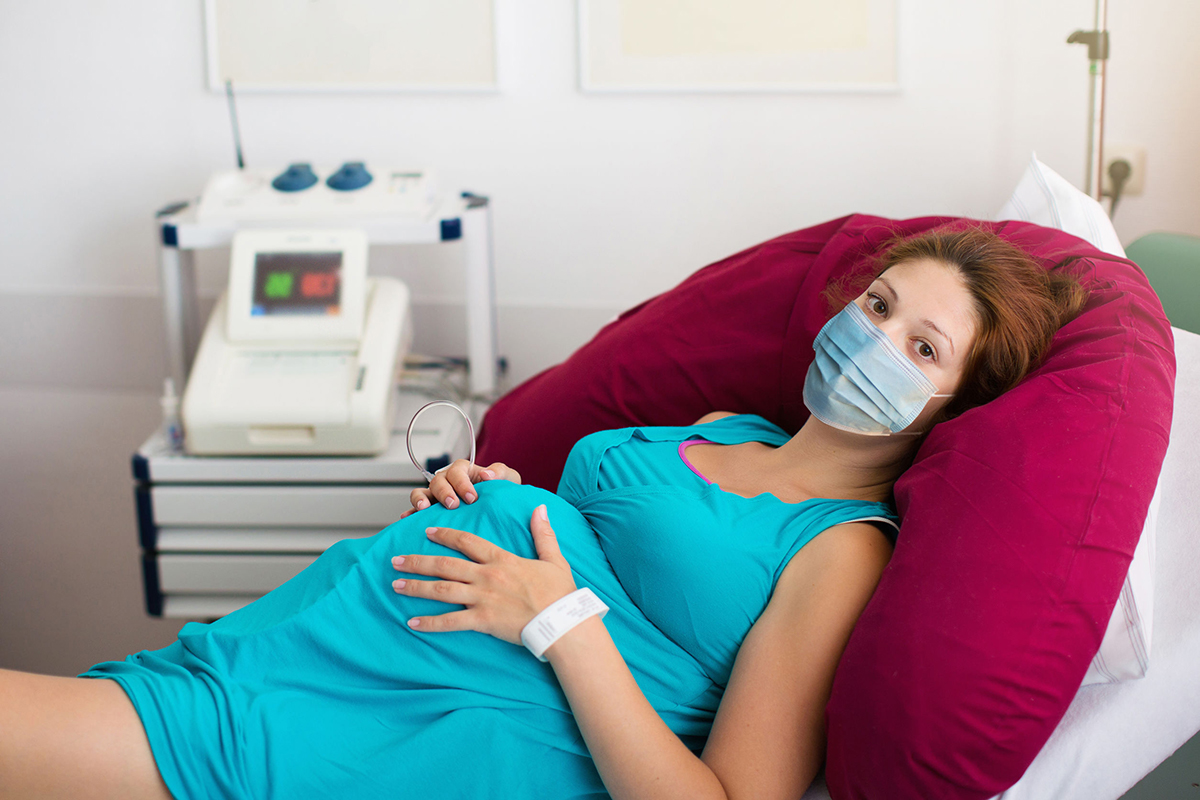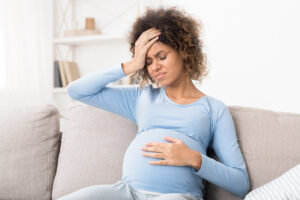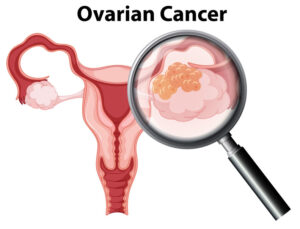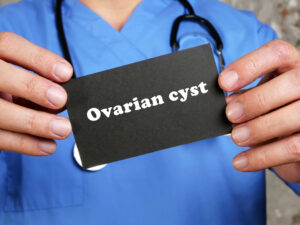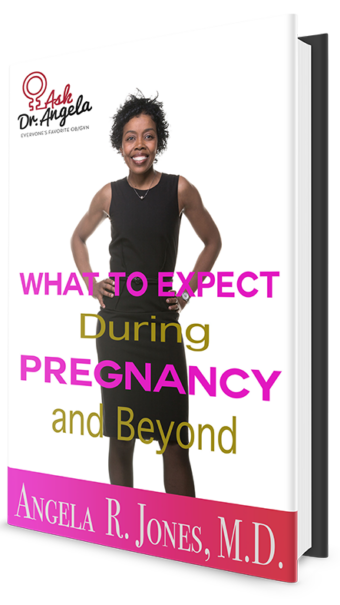Covid-19 happened upon us and completely upended our way of life.
It caused mayhem in 2020 with lockdowns instigating a rising fear in the population, as well as separation anxiety between families who were apart. People ended up looking to bulk buy disposable gloves, masks, and other safety precautions in an effort to protect themselves from the virus. Yet the result was thousands and thousands of deaths around the country.
I can’t even say that it “suddenly” or “unexpectedly” appeared, as we had plenty of notice to prepare. Hindsight is always 20/20; there is no use crying over spilled milk or pondering on what we could have done or should have done differently.
The fact of the matter is, COVID-19 is here and though we have recently added several vaccines to our arsenal of weapons to combat it, it won’t soon be gone. You can look into Products to keep you virus-free when you are out and about with social distancing but you still need to be as aware as possible.
COVID-19, is more formally known as the Coronavirus 2019, is caused by Sars-Cov-2 (Severe Acute Respiratory Syndrome Virus). This virus belongs to a family of viruses, the Coronaviruses, and is associated with illnesses such as the common cold, Severe Acute Respiratory Syndrome (SARS), and the Middle East Respiratory Syndrome (MERS).
In March 2020 the WHO (World Health Organization) declared the COVID-19 outbreak a pandemic. And so, here we are, still dealing with the aftermath.
COVID-19 Symptoms
Symptoms commonly seen with COVID-19 include but are not limited to:
- Fever
- Cough
- Fatigue
- Muscle aches
- Headache
- Chest pain
- Runny nose
- Sore throat
Loss of smell and taste can also be seen early on. Signs and symptoms typically appear from 2 to 14 days after exposure. The above list is but a sampling of the signs and symptoms that may or may not be seen with this virus.
How significantly one is affected varies from person to person. Some may be completely asymptomatic, while others may develop significant shortness of breath which may, in turn, develop into pneumonia requiring hospitalization and intubation.
High-risk COVID-19 Medical Conditions
Those considered to be in a high-risk group are at an increased risk of morbidity and mortality. Medical conditions that qualify as high risk include, but are not limited to:
- Pregnancy
- Heart disease
- Obesity
- Smoking
- Diabetes
- Any illness that compromises the immune system
As an OB-GYN, I get scores of questions about COVID. Being that pregnancy is one of the aforementioned high-risk medical conditions, it’s easy to understand why. Here are answers to some of the more common queries I receive.
Feel free to jump down to any section using the following links.
- Are pregnant women at a higher risk of contracting COVID-19?
- How can I prevent COVID-19 while pregnant?
- Does COVID-19 affect pregnancy?
- I am pregnant with COVID-19, what do I do?
- Will COVID-19 affect my baby?
- Does COVID-19 cause miscarriage?
- Does COVID-19 cause preterm birth?
- Could I pass COVID-19 to my unborn baby?
- COVID-19 vaccine during pregnancy and breastfeeding
- Can I take COVID-19 vaccine while pregnant?
- Can I take the COVID-19 vaccine while breastfeeding?
- Can I pass the vaccine to my baby?
- After birth, can COVID-19 affect my baby?
- How do I care for my newborn baby if I have COVID-19?
- COVID-19 and Pregnancy Outlook
- Can COVID-19 Vaccines Cause Infertility and Affect Future Pregnancy?
Are pregnant women at a higher risk of contracting COVID-19?

Anyone at any age can be infected with the coronavirus. Pregnant women are at no greater risk of getting COVID-19 than other healthy adults.
However, pregnant women or recently pregnant women who are older, overweight, and have pre-existing medical conditions such as hypertension and diabetes seem to have an increased risk of developing severe COVID-19.
In addition, because of the changes in their bodies and immune systems, pregnant women can be badly affected by some respiratory infections.
It is important as a pregnant woman to take necessary precautions against COVID-19 and report possible symptoms to your health care provider.
How can I prevent COVID-19 while pregnant?
As a pregnant woman, make sure to follow the guidelines to protect yourself from COVID-19.
- Wash your hands frequently with an alcohol-based hand rub or soap and water.
- Avoid touching your eyes, nose, and mouth with unwashed hands
- Practice social distancing, and avoid crowded places
- Wear a non-medical fabric mask where it is not possible to keep sufficient space between you and others
- Practice good respiratory hygiene by covering your mouth with your elbow or tissue when you cough or sneeze. Dispose of the used tissue properly.
Does COVID-19 affect pregnancy?
Studies have shown pregnant women with COVID are more likely to be admitted to intensive care than non-pregnant women with COVID. There is no evidence that COVID-19 will affect the development of your baby, and cause miscarriage or preterm birth.
However, severe COVID-19 increases the chance of developing blood clots. A recent study reported that among women giving birth in hospitals, those with COVID-19 had a higher chance of heart attack and blood clots than those women who did not have COVID-19 (even though the overall risk of heart attack or blood clots was still small).
- First Trimester
Although no evidence suggests that coronavirus can have an impact on early pregnancy, I do know that high fevers in early pregnancy can raise the risk of birth defects.
It is important to protect yourself from any disease or infection that can cause high fevers including coronavirus.
- Second and Third Trimester
Pregnant women who catch COVID-19 may be at an increased risk of becoming severely unwell compared to non-pregnant women, particularly in the third trimester.
I advise women to be cautious at this stage of pregnancy to prevent getting infected with the virus. A study of 127 pregnant women, of which 64 were infected with COVID-19, showed that newborns were not infected.
So, even if you get infected in your third trimester, your baby is not likely to be affected.
I am pregnant with COVID-19, what do I do?
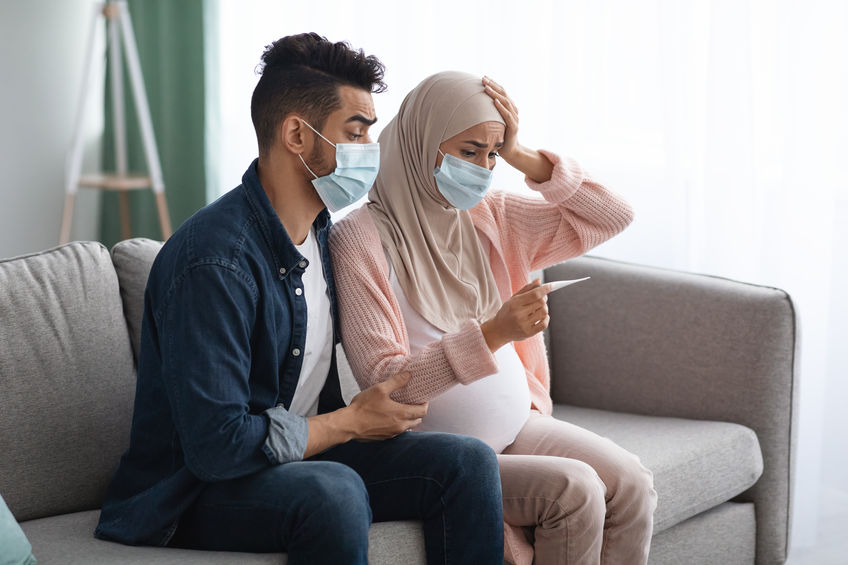
If you underwent a COVID-19 test that came out positive, there is no need to panic. Your local health care provider and obstetrician will ensure you get the necessary care you need.
You may be isolated at home to prevent loved ones, spouses, and other kids (if you have any) from getting infected.
If you have COVID-19 at the time of delivery, you may be encouraged to isolate yourself from your baby after your delivery. Since it’s necessary to bond and breastfeed for those first hours, your health care provider may recommend:
- Wearing a mask while breastfeeding
- Washing and sanitizing your hands before you breastfeed
- Keeping a distance of 6 feet away from the baby where possible.
Will COVID-19 affect my baby?
There is no evidence to suggest that COVID-19 will cause problems with your child’s development.
Does COVID-19 cause miscarriage?
There is no evidence yet to suggest that getting COVID-19 during early pregnancy can cause miscarriage.
Does COVID-19 cause preterm birth?
There is some evidence of premature births from women who have been infected with the coronavirus. Although evidence is inconclusive as to whether the virus was responsible for the preterm birth.
In a UK report of 1148 pregnant women infected with COVID-19 that were admitted to the hospital,
- 1 in 5 of those women gave birth prematurely.
- Women tested for COVID-19, but who were not experiencing symptoms were not likely to give birth prematurely.
There was no increase in infant death rate or stillbirth for mothers who had COVID-19.
Could I pass COVID-19 to my unborn baby?
There isn’t enough evidence to suggest that you can pass COVID-19 to your unborn baby. Studies carried out have not found the virus in the amniotic fluid or breast milk.
There are few cases where newborns to mothers who had COVID-19 have tested positive for the virus. These newborns remained well, however.
Although transmission from mother to unborn baby is probable, it is very low.
COVID-19 vaccine during pregnancy and breastfeeding

Let’s address some questions as regards the coronavirus vaccine. In the US currently, there are 3 vaccines that are authorized and recommended to prevent COVID-19.
They include:
- Pfizer- BioNTech
- Moderna and
- Johnson and Johnson / Janssen
Some are still undergoing clinical trials.
Can I take COVID-19 vaccine while pregnant?
Getting vaccinated for COVID-19 is a personal choice. There have been no cases reported for the vaccine affecting pregnant women.
Studies of these vaccines on animals before and during pregnancy have reported no safety concerns.
According to a report from USA Today, COVID-19 vaccines are safe and effective for pregnant women, even for babies.
You can take the vaccine if you’re pregnant. Be sure to speak with your health care provider to discuss the benefits and risks. Some people have had an allergic reaction after taking the vaccine.
Although no side effects to pregnant women have been reported, if you have a history of allergic reactions to vaccines, you have to let your healthcare provider know.
ACOG (American College of Obstetrics and Gynecology) does NOT recommend withholding the vaccines from women solely because of pregnancy, specifically if they meet criteria for vaccination based on the ACIP (Advisory Committee for Immunization Practices) priority groups.
You can get the vaccine during pregnancy. If you happen to work or live in an environment with an increased risk of exposure, there should be a conversation with your healthcare provider and serious consideration should be given.
Remember, whatever you decide, is the right decision for you. If you do decide to get vaccinated, the recommendation is to wait until you have completed the first trimester of your pregnancy.
Can I take the COVID-19 vaccine while breastfeeding?
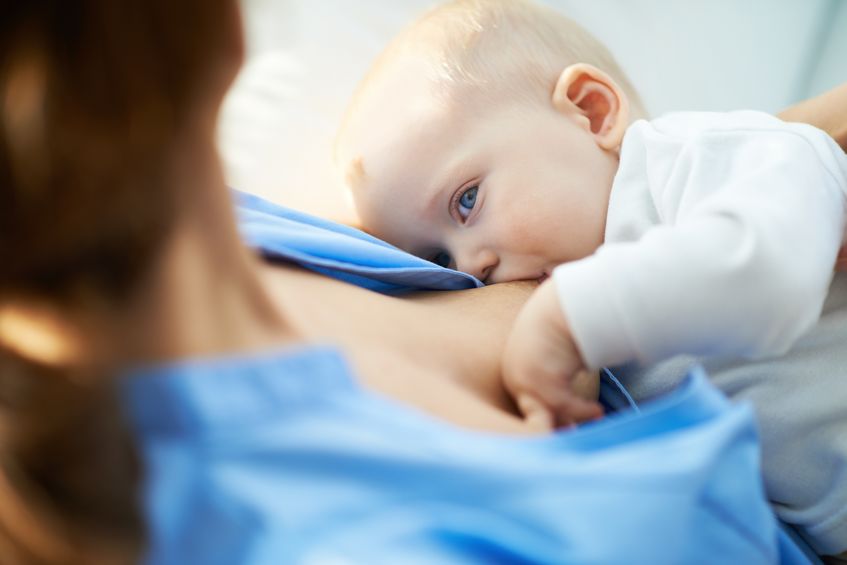
The COVID vaccine has raised concerns for lactating mothers. Clinical trials for the COVID-19 vaccine did not include breastfeeding mothers. However, studies are now suggesting its safety in lactating mothers, the effect on infants, and its effects on milk production and excretion.
Lactating mothers should take the vaccine just as non-lactating women if/when they meet the criteria for receipt of the vaccine based on the ACIP guidelines.
The CDC mentions that the COVID-19 vaccines are non-replicating. This means that they don’t reproduce inside host cells.
Non-replicating vaccines pose no risk for lactating mothers or their infants, so COVID-19 vaccines may not pose any risk too. The WHO and CDC do not recommend discontinuing breastfeeding after taking the vaccine.
If you are a nursing mother, and you choose to be vaccinated, you still have to discuss this with your healthcare provider.
After you have been fully vaccinated, learn how you can still protect yourself and others.
Can I pass the vaccine to my baby?
Babies born to women vaccinated in pregnancy had antibodies to COVID-19. So yes, you can pass the vaccine to the baby.
Although it’s not clear what antibody levels are protective against the disease, studies believe the babies have enough to be protected for at least some time.
Another report shows that pregnant women could pass the vaccine to their unborn baby, and lactating mothers to their babies through breastmilk.
Giving birth and caring for newborns during COVID-19
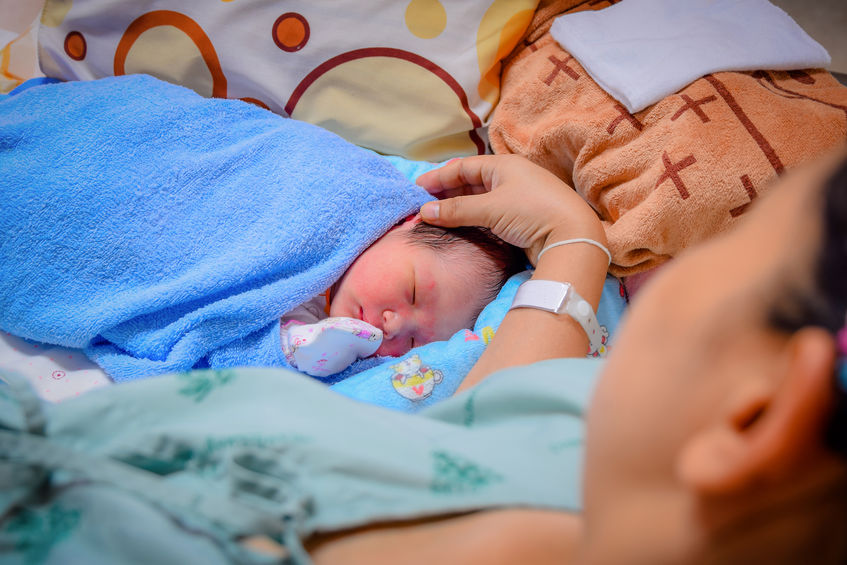
How do I prepare to give birth during COVID-19?
Your local health care provider will ensure your care and that of your baby during delivery. Antenatal and postnatal appointments in your clinic may have some changes and guidelines. Ensure you know what these changes are and follow them.
You might still be able to have a birth partner during labor and delivery. Although, your birth partner has to be tested for COVID-19, and should not have symptoms during your delivery.
For peace of mind, you may wish to consider visiting this life insurance provider in the event you are affected badly by COVID-19 during your pregnancy or birth. This does not mean you should assume the worst will happen during birth, though it does not hurt to be prepared if you are at risk.
Newborns do not appear to have an increased risk of getting infected with the virus. It is still important to take the necessary precautions, such as wearing a mask, washing your hands before breastfeeding, and limiting the number of persons around the child.
Household members that may have symptoms of COVID-19 or any illness should not touch or hold the baby.
How do I care for my newborn baby if I have COVID-19?
If you have COVID-19, you can still touch, hold and breastfeed your baby. However, you should take precautions to ensure that you’re protecting your baby from getting infected.
- Wash your hands before touching and breastfeeding your baby
- Wear a mask while breastfeeding
- Wear a mask when you’re 6 feet close to your baby even though you might not be breastfeeding
- If you can, have a healthy caregiver (who is at no increased risk of getting infected) to assist you with your baby
- Limit visitors to see your baby
It is important to note that you should never let your baby wear a mask, as this can cause suffocation.
Even after your symptoms might have disappeared, still take precautionary measures to keep your baby safe.
COVID-19 and pregnancy outlook
As scary as it might appear to be, being pregnant, giving birth, and caring for your newborn during COVID-19 should not cause worries, provided you are taking precautions and discussing concerns with your healthcare provider.
There are still some questions about COVID-19 and the future. One frequently asked question is if the COVID-19 vaccines can cause infertility and affect future pregnancies.
Can COVID-19 vaccines cause infertility and affect future pregnancy?
There is no evidence to suggest that COVID-19 vaccines can cause infertility or affect future pregnancy. Debunk all information that suggests such. Dr. Paul Offit from the Vaccine Education Centre, explains why in this video.
Hoping this blog post has served to inform, and ease any fears you might have about Covid-19, and its effects on pregnancy (before, during, and after).
Now that vaccines are readily available to most of the general population, I am hopeful that you will do your part in helping to prevent the future spread of the coronavirus and get vaccinated.
Until next time,
Choose Happiness.
Dr. Angela.
Resources
CDC – Different COVID-19 Vaccines.
https://www.cdc.gov/coronavirus/2019-ncov/vaccines/different-vaccines.html
CDC – Information about COVID-19 Vaccines for People who Are Pregnant or Breastfeeding.
https://www.cdc.gov/coronavirus/2019-ncov/vaccines/recommendations/pregnancy.html
Forough M., Maryam M., & Roya K. (2021). Pregnant women’s well-being and worry during the COVID-19 pandemic: a cross-sectional study.
https://bmcpregnancychildbirth.biomedcentral.com/articles/10.1186/s12884-021-03548-4
Sheryl A.M., Sarah D.C., Elizabeth K., & Maria M (2020). Pregnancy-related anxiety during COVID-19: a nationwide survey of 2740 pregnant women.
https://link.springer.com/article/10.1007/s00737-020-01073-5
National Institutes of Health Release (2020). Pregnant women in the third trimester are unlikely to pass SARS-CoV-2 infection to newborns.
https://www.nih.gov/news-events/news-releases/pregnant-women-third-trimester-unlikely-pass-sars-cov-2-infection-newborns
USA TODAY – Pregnant women ‘didn’t have the data’ – until now: COVID-19 vaccines are safe and effective, even for babies, study shows
Vaccinated mothers pass covid antibodies to babies in utero and through breast milk, early studies show
https://www.washingtonpost.com/health/2021/03/21/vaccine-pregnancy-antibodies-babies-COVID/

